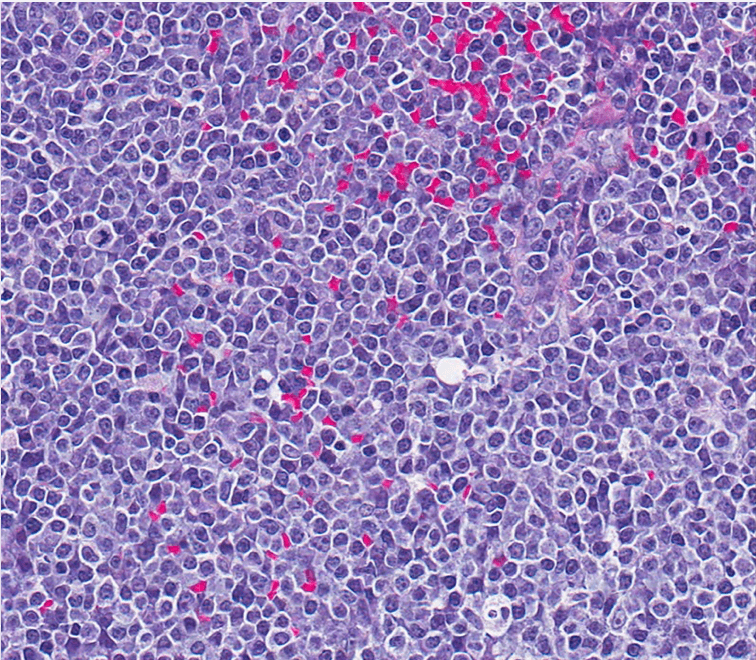Purdue Veterinary Medicine and Indiana University scientists are working together to find data-driven solutions in the search for better cancer treatments. A new cancer is diagnosed every 30 seconds in the United States. Every three minutes, two people in the U.S. die from cancer. Some of the deaths related to the disease arise from the fact that the same drug that helps one person can be detrimental to another with the same type of cancer.
“This is one of the strong cases for personalized medicine,” said Dr. Nadia Atallah Lanman, a research assistant professor in the College of Veterinary Medicine’s Department of Comparative Pathobiology. Dr. Lanman manages the Purdue University Collaborative Core for Cancer Bioinformatics (C3B). “We are training the next generation of scientists to be able to move oncological research forward in a data-driven manner.”
Directed by Dr. Jun Wan, assistant professor of medical and molecular genetics at the Indiana University School of Medicine, the C3B is a joint bioinformatics core between the Purdue University Center for Cancer Research (PCCR) and IU’s Melvin and Bren Simon Comprehensive Cancer Center (IUSCC). Bioinformatics is a diverse interdisciplinary field, which combines statistics, biology, computer science, mathematics and engineering to analyze and interpret complex biological data sets. Researchers seek to understand basic and applied research questions about the development of cancer and predict which people will respond well to which treatments.

C3B scientists collaborated with two PVM faculty members on a project that uses pet dogs with naturally occurring diffuse large B-cell lymphoma (DLBCL) as a model for studying chemotherapy resistance in lymphoma patients. Associate Professor of Comparative Oncology Mike Childress, a member of the Department of Veterinary Clinical Sciences faculty, and Professor of Basic Medical Sciences John Turek worked on the project with Purdue College of Sciences faculty member David Nolte, who is the Edward M. Purcell Distinguished Professor of Physics and Astronomy.
DLBCL is an aggressive form of non-Hodgkin’s lymphoma and half of patients diagnosed with the disease will die because of the development of chemotherapy resistance. The project combined gene mutation data, gene expression data and data from a technique, biodynamic imaging (BDI), developed by Drs. Turek and Nolte, which performed phenotypic profiling of three-dimensional tissue samples.
Genetic mutations, BDI data and gene expression signatures related to the development of chemotherapy resistance and poor treatment outcome were identified. The study could change the way doctors prescribe treatments for DLBCL, as well as identifying molecules and processes that can be targeted by new chemotherapeutics, which could help patients who show resistance to standard chemotherapy regimens.
“The fact that the two universities are working together to continue building and running the C3B is truly a strength,” Dr. Lanman said. “These complex problems are not going to all be solved by one researcher. We must work together to develop personalized therapies and to really get to the heart of what causes cancer, and what can be done to prevent cancer.”
Dr. Tim Ratliff, the Robert Wallace Miller Director of the Purdue University Center for Cancer Research and PVM Distinguished Professor of Comparative Pathobiology, has worked with C3B scientists in his research, which focuses on understanding immune regulation and the development of novel approaches for treating urologic cancers such as bladder cancer and prostate cancer through the modulation of anti-cancer immunity.
The Ratliff group, in collaboration with the C3B, has been using single-cell RNA sequencing to probe the heterogeneity in urologic cancers and to identify changes in gene expression that correspond to disease development and severity, as well as to identify targets which could be exploited to develop new treatments for these types of cancers. So far, this project has led to the identification of pathways and potential targets that could enhance treatment of castration resistant prostate cancer, which is currently incurable.
Scientists from the Purdue Center for Cancer Research also work with the Purdue Research Foundation Office of Technology Commercialization to patent and commercialize innovations to move them from the research labs to clinics. The cancer research and technology work aligns with Purdue’s Giant Leaps celebration of the university’s global advancements in health as part of Purdue’s 150th anniversary. It is one of the four themes of the yearlong celebration’s Ideas Festival, designed to showcase Purdue as an intellectual center solving real-world issues.
